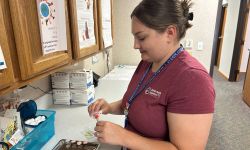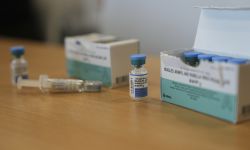Detroit moving faster to restore water, but hundreds still without service

Ten days into an emergency effort to restore water service during the coronavirus crisis, Detroit has turned taps back on to 443 customers, city records show.
That’s about one-third of the 1,152 residents whose water has been off for months and have called for help, records show. Another 2,000 or more occupied homes also could be without water due to nonpayment, but their residents haven’t reached out to the city for help. Crews have put door-hangers on 2,640 homes whose water was shut off within the past year, urging occupants to get help.
Detroit is rushing to restore service because of sanitation fears as the coronavirus pandemic sweeps Michigan. Frequent hand-washing is the top line of defense against getting the virus.
Detroit is waiving normal reconnection fees and charging $25 for disconnected residents plus $25 a month toward their debt. The state of Michigan is paying the $25 fee for another three weeks.
Residents without service should call 313-386-9727.
The restoration campaign first was delayed by technology issues, as phone lines were jammed, and then because the city didn’t have enough plumbing contractors. Water spokesman Bryan Peckinpaugh said the “pace is picking up” as more lines were installed and contractors hired. In many cases, water has been off for so long that extensive plumbing repairs are necessary, delaying normal restorations that typically take 20 minutes or so, city officials have said.
Water activists remain upset by the pace and this week called on Whitmer to set up water stations to hand out water and use the National Guard to go door-to-door to restore water.
“We are deeply concerned that Detroit officials are unable to carry out your instruction to restore water and sanitation services to all ... households,” a group known as the People’s Water Board Coalition wrote in a letter to Whitmer on March 16.
“We are aware of homes that have been without DWSD service for weeks, months and years.”
The group noted that COVID-19 fears have caused a “frenzy” among customers “who are buying bottled water in mass quantities from wholesale suppliers, warehouses and retail stores … [and] causing low-income residents without water service to compete (unsuccessfully) with residents who have safe, clean tap water.”
City records obtained by Bridge Magazine show the number of presumably occupied houses whose water was disconnected in 2019 is closer to 9,500. City officials said many of those homes are now either vacant or occupied by squatters.
RELATED:
- Michigan families can get food, cash, internet during coronavirus crisis
- Michigan coronavirus Q&A: Reader questions answered
- How to apply for unemployment benefits in Michigan amid coronavirus crisis
- How to get tested for coronavirus in Michigan
- Can I get tested for coronavirus in Michigan and other questions answered
- Here’s a map of where Michigan kids can get meals during school closure
- The first line of defense against coronavirus: Try soap, not a mask
See what new members are saying about why they donated to Bridge Michigan:
- “In order for this information to be accurate and unbiased it must be underwritten by its readers, not by special interests.” - Larry S.
- “Not many other media sources report on the topics Bridge does.” - Susan B.
- “Your journalism is outstanding and rare these days.” - Mark S.
If you want to ensure the future of nonpartisan, nonprofit Michigan journalism, please become a member today. You, too, will be asked why you donated and maybe we'll feature your quote next time!








